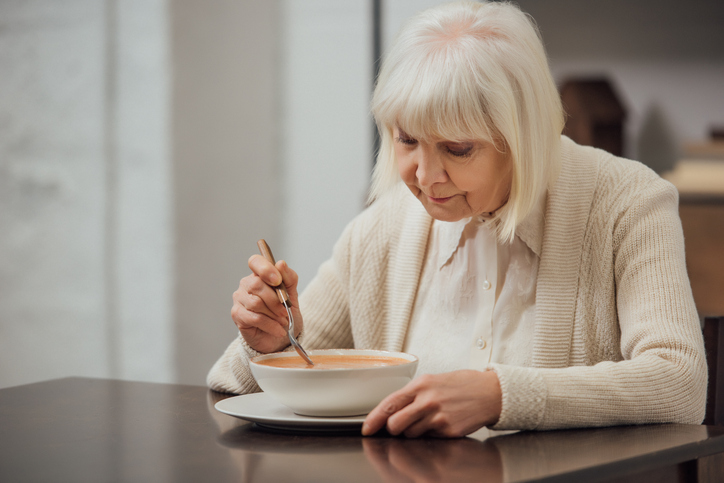
Appetite loss in older adults, while not uncommon, should be looked into right away.
You’ve just made a large batch of Mom’s special chili recipe. The house smells delicious, and you cannot wait to have a helping. But while you are savoring not only the taste but the memories the meal creates, Mom is simply stirring the food around in her own bowl. And it is not the first time. Lately her desire for food is declining, and it’s starting to alarm you.
What Causes Appetite Loss in Older Adults?
Appetite loss is actually rather common for aging adults, for many reasons, including:
- A routine that doesn’t include regular mealtimes
- Feeling as though they’ve lost control over other aspects of life
- A sedentary lifestyle
- Dehydration
- Loneliness and having no one to share meals with
- Loss of taste or smell that makes food less appealing
- Depression and/or grief
- Difficulty with preparing meals
- Problems with chewing, swallowing, or self-feeding
It’s vital to first speak with the person’s doctor and dentist to rule out any medical ailments or medication side effects that could be causing the issue. When it’s established that there isn’t a clinical reason behind the change in appetite, try these suggestions to help revive the older adult’s joy in eating and enhance nutrition.
- Serve high-calorie foods in small amounts. In place of three big meals per day, try smaller servings more frequently. You can still make larger batches of favorite meals, splitting them up into individual portions that can be frozen and reheated. Other foods to try that will provide important nutrients include whole milk, finely chopped meat or eggs, yogurt, diced fruit, avocado, peanut butter or other nut butters.
- Include softer options. During the summer months when fruit is especially appetizing, try mixing up some healthy smoothies. Summer can also be a great time for ice cream, frozen yogurt, and milkshakes. Make it even more festive and fun by inviting the family over to make their own unique treats and enjoying them outdoors together.
- Create a schedule. Instead of waiting until the person says they are hungry, set designated times every day and stick to a routine for meals. It may take some experimentation to figure out the best schedule, but give the new routine some time to work before fine-tuning. Make sure the person’s routine includes plenty of exercise and physical activity as well, which helps to increase appetite.
- Adapt foods and utensils accordingly. If self-feeding is difficult, there is a wide selection of adaptive utensils to explore. You can also make eating easier by serving food that is cut into small, bite-size portions, as well as finger foods such as string cheese, chicken tenders, fish sticks, sandwiches, etc.
Compassionate Nursing Services is here to help older adults overcome appetite loss with professional home care services. We can prepare nutritious meals and snacks, provide inspiration to stay physically active, and provide friendly companionship during mealtime to make it more pleasurable. Reach out to us online or give us a call at 314-432-4312 for more information on how we can help a person you know in Oakville, Des Peres, Creve Coeur, and surrounding communities.
